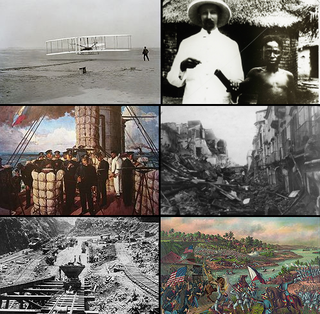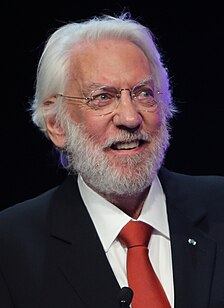| |||
|---|---|---|---|
| Years in film |
|---|
 |
| 19th century |
| 1870s |
The decade of the 1900s in film involved some significant films.
| |||
|---|---|---|---|
| Years in film |
|---|
 |
| 19th century |
| 1870s |
The decade of the 1900s in film involved some significant films.
Several full-length films were produced during the 1900s (decade).
A century is a period of 100 years. Centuries are numbered ordinally in English and many other languages. The word century comes from the Latin centum, meaning one hundred. Century is sometimes abbreviated as c.

The history of film as an artistic medium chronicles the development of a visual art form created using film technologies that began in the late 19th century.

The 1900s was a decade that began on January 1, 1900, and ended on December 31, 1909. The Edwardian era (1901–1910) covers a similar span of time. The term "nineteen-hundreds" is sometimes also used to mean the entire century from January 1, 1900 to December 31, 1999.

The Wonderful Wizard of Oz is an American children's novel written by author L. Frank Baum and illustrated by W. W. Denslow. The first novel in the Oz books, the Kansas farm girl named Dorothy ends up in the magical Land of Oz after she and her pet dog Toto are swept away from their home by a tornado. Upon her arrival in Oz, she learns she cannot return home until she has destroyed the Wicked Witch of the West.

The cinema of Australia had its beginnings with the 1906 production of The Story of the Kelly Gang, arguably the world's first feature film. Since then, Australian crews have produced many films, a number of which have received international recognition. Many actors and filmmakers with international reputations started their careers in Australian films, and many of these have established lucrative careers in larger film-producing centres, such as the United States.

Donald McNichol Sutherland is a Canadian actor whose film career spans over six decades. He has been nominated for nine Golden Globe Awards, winning two for his performances in the television films Citizen X (1995) and Path to War (2002); the former also earned him a Primetime Emmy Award. An inductee of the Hollywood Walk of Fame and Canadian Walk of Fame, he also received a Canadian Academy Award for the drama film Threshold (1981). Multiple film critics and media outlets have cited him as one of the best actors never to have received an Academy Award nomination. In 2017, he received an Academy Honorary Award for his contributions to cinema. In 2021, he won the Critics' Choice Television Award for Best Supporting Actor in a Movie/Miniseries for his work in the HBO miniseries The Undoing (2020).

Cinematography is the art of motion picture photography.
An art movement is a tendency or style in art with a specific common philosophy or goal, followed by a group of artists during a specific period of time, or, at least, with the heyday of the movement defined within a number of years. Art movements were especially important in modern art, when each consecutive movement was considered as a new avant-garde movement.

Silent comedy is a style of film, related to but distinct from mime, invented to bring comedy into the medium of film in the silent film era (1900s–1920s) before a synchronized soundtrack which could include talking was technologically available for the majority of films. Silent comedy is still practiced, albeit much less frequently, and it has influenced comedy in modern media as well.

Cecil Milton Hepworth was a British film director, producer and screenwriter. He was among the founders of the British film industry and continued making films into the 1920s at his Hepworth Studios. In 1923 his company Hepworth Picture Plays went into receivership.

The Pratapgarh district is one of the districts of Uttar Pradesh state of India, and Pratapgarh city is the district headquarters. Pratapgarh district is a part of Allahabad division. The total area of Pratapgarh district is 3730 Sq. Km.
A list of the most notable films produced in the Cinema of Mexico split by decade of release. For an alphabetical list of articles on Mexican films see Category:Mexican films.

There Will Be Blood is a 2007 American epic period drama film written and directed by Paul Thomas Anderson, loosely based on the 1927 novel Oil! by Upton Sinclair. It stars Daniel Day-Lewis as Daniel Plainview, a silver miner turned oilman on a ruthless quest for wealth during Southern California's oil boom of the late 19th and early 20th centuries. Paul Dano, Kevin J. O'Connor, Ciarán Hinds, and Dillon Freasier co-star.

Lajos Koltai, ASC, HSC, is a Hungarian cinematographer and film director best known for his work with legendary Hungarian director István Szabó, and Italian filmmaker Giuseppe Tornatore. He was nominated for an Academy Award in 2000 for his work on the film Malèna.
The decade of the 1910s in film involved some significant films.
Gerald Marks was an American composer from Saginaw, Michigan. He was best known for the song "All of Me" which he co-wrote with Seymour Simons and has been recorded about 2,000 times. He also wrote the songs "That's What I Want for Christmas" for the film Stowaway starring Shirley Temple, and "Is It True What They Say About Dixie" recorded by Al Jolson and Rudy Vallee.
The 1900s may refer to:

Bhojpuri cinema, also known as Birhawood, is an Indian film industry of Bhojpuri-language motion pictures. It is based in Patna, Bihar. The Bhojpuri movie industry is a burgeoning behemoth, a Rs 2000 crore industry that is fast moving past the likes of A Listers like Ravi Kishen and Manoj Tiwari, and breaking fresh ground and creating new milestones.
Shinpa (新派) is a form of theater in Japan, usually featuring melodramatic stories, contrasted with the more traditional kabuki style. It later spread to cinema.